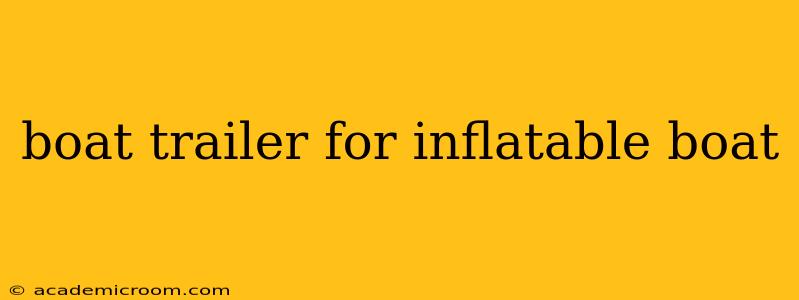Inflatable boats offer incredible portability and convenience, but transporting them safely and securely requires the right trailer. Choosing the wrong one can lead to damage to your boat, vehicle, or even create a dangerous driving situation. This comprehensive guide will help you navigate the world of inflatable boat trailers, ensuring you make the best choice for your needs.
What are the Different Types of Inflatable Boat Trailers?
Several types of trailers cater specifically to inflatable boats, each with its own set of advantages and disadvantages. The best option depends heavily on your boat's size, weight, and your budget.
-
Lightweight Roll-on/Roll-off Trailers: These trailers are ideal for smaller inflatable boats. Their simple design makes loading and unloading a breeze, simply roll your deflated boat onto the trailer. They are generally affordable but might not be suitable for larger or heavier inflatables.
-
Bungee-Style Trailers: These trailers utilize bungee cords or straps to secure the inflatable boat. They are often lightweight and easy to store, making them popular for smaller boats. However, securing the boat properly is crucial to prevent damage during transport.
-
Custom-Built Trailers: For larger or more specialized inflatable boats, a custom-built trailer might be necessary. These trailers are designed to perfectly accommodate your boat's dimensions and weight, offering maximum security and protection. While more expensive, they provide superior stability and peace of mind.
-
Galvanized Steel Trailers: Offering superior durability and resistance to corrosion, these trailers are a solid investment. They're often used for heavier inflatable boats or those used in saltwater environments.
What Size Trailer Do I Need for My Inflatable Boat?
Determining the correct trailer size is paramount. Consider these factors:
-
Boat Length & Weight: The trailer must be long enough to accommodate your boat's length, with extra space for the motor and accessories. It must also have a weight capacity exceeding your boat's total weight (including motor, fuel, and gear).
-
Type of Boat: Different inflatable boat designs (RIBs, pontoons, etc.) might require specific trailer features. For example, a RIB (Rigid Inflatable Boat) might need a keel roller to support its hard hull.
-
Additional Accessories: Account for the weight of your outboard motor, fuel tank, and any other equipment you plan to transport.
How Much Weight Can My Inflatable Boat Trailer Hold?
The trailer's weight capacity is clearly stated on the manufacturer's label. Never exceed this limit. Overloading can lead to structural failure, unsafe driving conditions, and legal penalties. Always weigh your boat and equipment to ensure you have the appropriate capacity.
What Features Should I Look for in an Inflatable Boat Trailer?
Several key features enhance the safety and convenience of inflatable boat trailers:
-
Winch: A good quality winch makes loading and unloading significantly easier.
-
Lights and Safety Chains: Essential for safe road transport and legal compliance.
-
Keel Rollers (for RIBs): Provides support for the hard bottom of a rigid inflatable boat.
-
Tie-Down Straps: Secure your boat firmly to prevent shifting during transport.
-
Adjustable Bunk Supports: Allow for a customized fit, ensuring your boat is well-supported.
-
Spare Tire: A spare tire is a valuable asset for unexpected situations.
How Do I Properly Secure My Inflatable Boat to the Trailer?
Securing your boat correctly is crucial for safe transportation. Follow these steps:
-
Properly Inflate the Boat: A fully inflated boat is easier to secure and less prone to damage.
-
Use Appropriate Tie-Down Straps: Ensure they are rated for the weight of your boat.
-
Distribute the Straps Evenly: Avoid concentrating the tension on one point.
-
Secure the Motor: Your outboard motor also needs secure fastening.
-
Check Straps Regularly: Stop periodically during your journey to check the tightness of the straps.
By carefully considering these factors and selecting the appropriate trailer, you can enjoy years of safe and convenient transportation for your inflatable boat. Remember, safety should always be your top priority.
